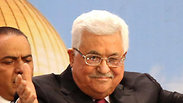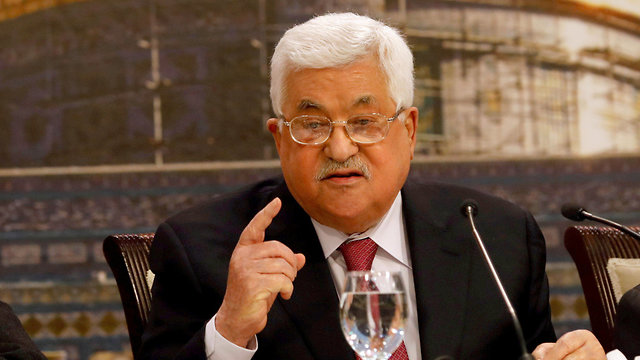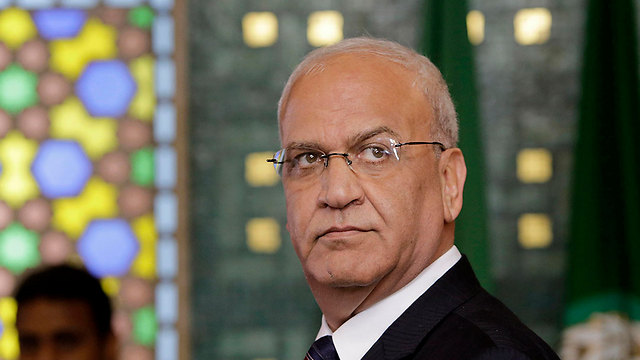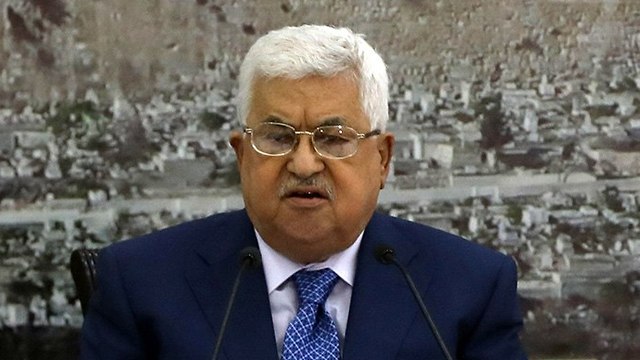
Palestinian chief negotiator Saeb Erekat said Monday that Palestinian institutions are robust enough for endure the post-Abbas era, amid circulating rumors about the Palestinian Authority (PA) president’s deteriorating health, who was hospitalized three times in the last week, and will remain in hospital at least one more night.
“Believe me, Palestinian institutions are much stronger than many of you in Israel think,” Erekat said when asked in an interview with Ynet if the Palestinian leadership is prepared for day after Mahmoud Abbas’s leadership.
Little information was given about the veteran leader's condition.
The hospital visits by Abbas, 82, have raised inevitable questions about his health and the future of the Palestinian leadership.
Abbas underwent minor ear surgery last Tuesday but went back into al-Istishari Hospital in Ramallah briefly overnight on Saturday/Sunday. He was then rushed back later that day, for what doctors described only as "medical tests".
Erekat said he spent an hour with Abbas on Monday and told Ynet before the latest development that the president is "doing very well" and that he "is in good health. He's recovering."
"Last Tuesday he had a surgery in his right ear, and he left the hospital on the same day. Then he had some complications and some fever and yesterday he was admitted to the hospital," Erekat said.
The PLO official said when he went to visit Abbas, the Palestinian leader exclaimed "Why did you come to see me? Get out!" because he was worried Erekat, who had undergone a lung transplant several months ago, would get sick from visiting the hospital.
Erekat added that Abbas's fever had gone down and that he is expected to be discharged from the hospital either Monday or Tuesday.
He also dismissed claims Abbas was suffering from severe infection. "I was there, I spoke to the doctors. He had some infection and his fever was a little high, but by four in the afternoon yesterday his fever was down," Erekat said.
Erekat also said that despite the mounting tensions between Israelis and Palestinian, particularly on the Gaza border, peaceful negotiations based on a two-state solution remained the only viable option.
“What’s happening in Gaza is the absence of peace,” he said, before slamming US President Donald Trump, who Palestinians have ostracized over his pro-Israel stance.
“Then comes President Trump to add fuel to the fire. That is the situation. What do you expect? What do you think is going to happen? Gaza has been under Israeli siege for eleven years now. That’s a fact,” he said.
Israel says that thousands of trucks carrying humanitarian goods are transported into the coastal enclave every day for the residents, but insists that its forces prevent the importation of goods that can be used by the ruling Hamas terror group to wage war on Israel and carry out terror attacks.
“Palestinians and Israelis need to realize that the only salvation for them is peace," Erekat continued. "The only salvation for them is to talk, to achieve an agreement based on a two-state solution on the 1967 lines … This is the only way out.
The sensior PA diplomat also criticized Prime Minister Benjamin Netanyahu for his handling of the conflict.
"Netnayhau's dream of one state, two systems apartheid will not work. And Palestinian dreams that they can achieve one state, equal rights—no Israeli will accept that. So if we leave this in a vacuum we will have bloodshed and we must stop this nonsense now," he urged.
“We need peace more than anybody else. And no one stands to lose more in the absence of peace than Palestinians and Israelis. We have no other options apart from the two-state solution."
Uncertainty over Abbas's medical condition
Since Dr. Saed al-Sarahneh, medical director of the al-Istishari Hospital, said that Abbas had come back "for medical tests" after the surgery on Tuesday, no Palestinian medical official has gone further than the doctor's statement: "All the tests are normal and his medical condition is reassuring."
Reports on Abbas' treatment have been conflicting.
One Palestinian official in Ramallah said on Sunday there had been complications following the ear surgery and that Abbas was running a fever. The same day a source at al-Istishari hospital said his condition was unrelated to the ear operation and that he had being given antibiotics to treat an inflammation in the chest.
The official Palestinian news agency Wafa put out a report on Monday afternoon giving no details of Abbas' health. It said only that Abbas had received a phone call from the secretary of the Arab League who "checked on the president's health and wished him good health and strength."
Abbas, a heavy smoker, was hospitalized in the United States for medical checks in February during a trip to address the UN Security Council.
The Western-backed leader became Palestinian president after the death in 2004 of his predecessor, Yasser Arafat. He pursued US-led peace talks with Israel but the negotiations broke down in 2014.
Abbas's democratic mandate expired eight years ago and there has been no presidential election since 2005 and the term of office is only five years. His authority is essentially limited to the West Bank, with the Islamist terror group Hamas in control of the Gaza Strip.
Abbas has no formal deputy in the Palestinian Authority. In theory, the speaker of parliament would take over as president on an interim basis were Abbas to die in office. But the parliamentary speaker's role is held by a Hamas representative, and Fatah is likely to dispute the constitutional legitimacy of him taking over.
In 2016, Abbas established the Palestinian Constitutional Court, the head of which could take charge until an election is held.
Abbas is also chairman of the executive committee of the PLO, a position to which he was re-elected unopposed on May 4.



















